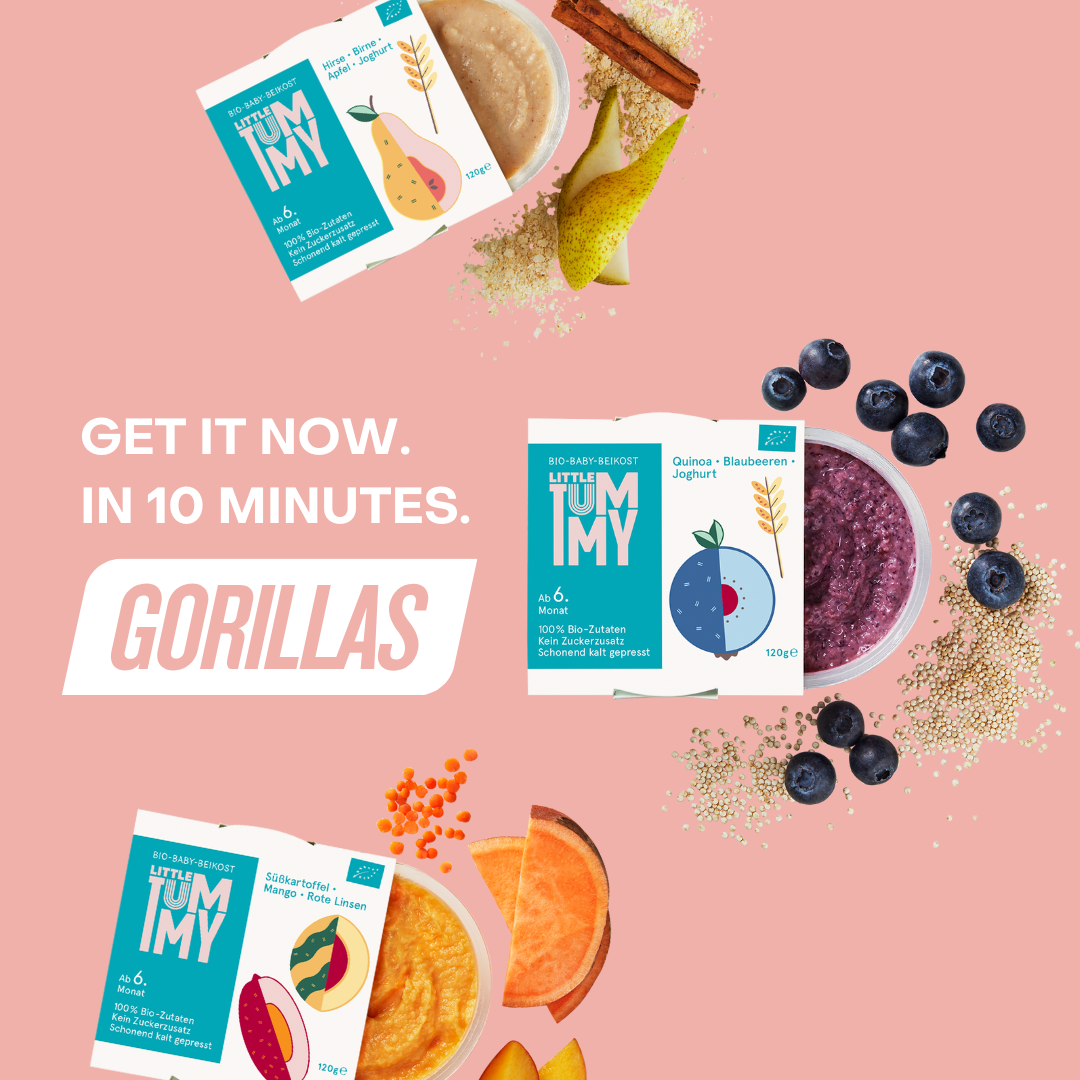
Little Tummy bei Gorillas in Deutschland erhältlich
Tolle Neuigkeiten für unsere Eltern in Deutschland: Du kannst Little Tummys frischen Bio-Babybrei jetzt bei Gorillas bestellen!
First of all: Sugar is everywhere and it can be a good source of energy
Almost every single food item contains sugar as it is the building block for all carbohydrates. Sugar and carbohydrates are more or less the same and every food contains carbohydrates - or sugar!
The smallest building block for carbohydrates is simple, single unit sugar, such as glucose or fructose (fruit sugar). Several single unit sugars are combined to more complex chains. They are called complex carbohydrates. An example of this is starch, which we find in potatoes.
In fact, the first food babies eat (breast milk or formula) is composed of lactose, also known as milk sugar.
When we talk about ‘bad’ sugars, we usually mean table sugar - or sucrose. It is composed of only two sugar molecules. We will explain later why it is not a great choice for your little one.
So why worry about sugar?
If the food we eat provides more energy than we burn, our body stores this excess energy as fat. This means that overeating over a long period of time will lead to obesity.
Sweet and sugary foods are often energy-dense. Sweetened drinks and fruit juices are relatively high in sugar but don’t make us feel satisfied as the liquid is processed rapidly in our stomach. They can, therefore, lead to overconsumption of energy.
High consumption of sugar has also been linked to tooth decay.
The type of sugar we consume is more important than the amount.
The type and quantity of sugar we eat is much more important than if we eat it at all. Our body needs sugar as energy fuel and it is the main energy source for our brain. For infants, about 40 - 50% of calories should come from carbohydrates.
Sugar in its simple form (table or fruit sugar) is easily absorbed and gives us a peak in our blood sugar level. This is good if we need energy quickly but it won’t satisfy us and we will become hungry again in a little while.
Complex carbohydrates are chains of sugar molecules strung together. You can find them in whole grains, lentils, beans, veggies and all other sorts of fibre-rich foods. Our body takes a longer time to break down these chains into smaller sugar molecules. This is why complex carbohydrates keep us satisfied for longer and keep our blood sugar level stable.
Choosing complex carbohydrates for your little one will help them to get used to a healthy diet later on in life, as the first few years of their lives set their preferences.
How much sugar can my baby have?
This is where it gets somewhat complicated. Children above the age of 4 years should not consume more than 19g of sugar per day, which equals 5 cubes of sugar per day.
For children below the age of 4 years, official guidelines are vague and simply state not to consume sugar-sweetened drinks and food with sugar added to it.
‘Added sugar’ not only includes table sugar, but also free sugar from fruit juices and other highly processed fruits and vegetables (e.g. fruit purees, which are the base ingredient for most baby food pouches on supermarket shelves).
What about natural sugars?
So-called ‘natural sugars’ such as agave syrup, honey or maple syrup are still free sugars and will have the same effect as table sugar.
How can I avoid giving too much sugar to my children?
How can Little Tummy help?
At Little Tummy, we make sure that we keep the amount of simple sugar in our meals to a minimum. We do this by cold-pressing our meals instead of heat-treating them. Extreme heat sets fruit sugars free and breaks down more complex sugars. Our gentle cold-pressure method ensures that we preserve the complex carbohydrates. We also carefully choose ingredients which are sources of fibre, such as dark green veggies, ancient grains, chickpeas and lentils. We are here to help you raise a healthy eater!
✕